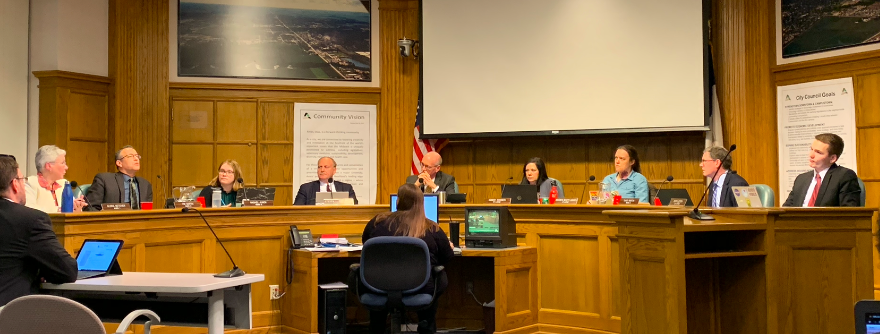Ames City Council approves the second phase of the Community Development Block Grant
June 9, 2020
The Ames City Council voted to approve the second substantial amendment of the Community Development Block Grant annual action plan.
The meeting took place at 6 p.m. Tuesday via Zoom.
In response to COVID-19, the U.S. Department of Housing and Urban Development (HUD) informed the city of Ames will receive $353,515 from the special allocation of Community Development Block Grant.
The allocation was authorized by the Coronavirus Aid, Relief and Economic Security Act (CARES Act).
After receiving public feedback for what the funds should be used for, the comments were brought to the Council to begin writing a draft for a COVID-19 program for a renter and homeowner relief assistance program to help with rent and utilities.
Housing Coordinator and NAACP Rep. Vanessa Baker-Latimer presented a Duplication of Benefits (DOB) Policy to cover what DOB would mean as well as guidelines for Rent and Utility Relief Assistance Program guidelines but said it could change depending on HUD’s final guidelines.
Baker-Latimer said the minimum guidelines stated if applicants also receive assistance from other programs it must be tracked and the applicant may be required to pay back the money to the city of Ames.
The Rent and Utility Relief Assistance Guidelines break down who is eligible for the program by evaluating how someone is experiencing loss directly related to COVID-19. One would have to be in good standing as of March 31 since President Donald Trump signed the CARES Act on March 27.
Due to a rise in unemployment, the guidelines allow households with incomes at or below 80 percent within the median income of the Ames to be eligible.
Households who fall under section 8, a government program that assists low-income families to pay for housing, are not eligible for the program.
Public housing, households receiving government-based rental assistance and those that receive monthly assistance through community services or charitable programs are also not eligible for the program.
Baker-Latimer said the funds can not go toward assistance for rent before March 27 and there is a cap of three months of assistance for rent and utilities and it can not exceed $3,000. Households must show a need for assistance and those with sufficient available savings may receive a reduced amount or be denied assistance.
“We haven’t been given specific guidelines because the order came out from HUD and it was to respond, prepare and all of that related to COVID-19,” Baker-Latimer said. “I think most of the entitlement I have been working with were saying it is someone who has lost their job because of closure due to the state order, that was a direct impact of COVID-19.”
Ward 2 Rep. Tim Gartin said he had concerns about determining between the differences of evictions and foreclosures while looking over the guidelines.
“This discussion of choosing which type of people in distress are going to receive assistance, I think is a very complicated one, so this is not apples and apples,” Gartin said. “I’m hoping we do not find ourselves in that spot because I think we are going to need a lot of help in thinking through the implications of an eviction versus a foreclosure. I don’t think that is an easy lift.”
All guidelines set by HUD have yet to be finalized.







